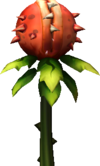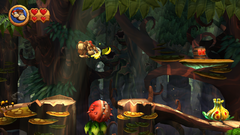Chomp (Donkey Kong Country series)
It has been requested that this article be rewritten. Reason: Is this article supposed to be about the Chomp family in general or the more basic Chomps?
- This article is about the carnivorous plant enemies from Donkey Kong Country Returns. For the shark enemies from Donkey Kong Country, see Chomps.
| Chomp | |||
|---|---|---|---|
  Red Chomp (left) and biting Chomp (right) | |||
| First appearance | Donkey Kong Country Returns (2010) | ||
| Latest appearance | Donkey Kong Country Returns HD (2025) | ||
| |||
| |||
| |||
Chomps are enemies in Donkey Kong Country Returns and its Nintendo 3DS and Nintendo Switch ports. They are first encountered in King of Cling, and later appear in levels of the Forest world. These carnivorous plant-like enemies mostly spring up and try to bite Donkey Kong or Diddy Kong, costing them a heart. There are a few types of Chomps, but the most common type are the red Chomps,[1] which can only be defeated if a barrel is thrown at them. The red Chomps bite four times before they attack. Yellow variants, only referred to as biting Chomps,[2] attack similarly but at longer intervals, biting eight times before it attacks instead of four.
Chomps greatly resemble the Piranha Plants of the Super Mario franchise. In fact, some Chomps, along with other elements from the Donkey Kong Country series, are found in the DK Jungle golf course of Mario Golf: World Tour. They function not only as decorative objects, but also as hindrance for the golf ball. They are preponderantly present at Hole 6, where there is also a giant Chomp.
The Carnivorous Plantlifes from Donkey Kong Country: Tropical Freeze share similarities with Chomps in appearance and attack pattern. These enemies have a pear-shaped head dressed with crowns of leaves, and also very thick, cartoony lips that cover their teeth.
Variants[edit]

There are a few other variants of Chomp:
- The giant Chomp is a red Chomp that attacks quicker, and cannot be defeated by any regular attacks. Like the normal-sized red Chomp, it can only be defeated with a barrel.
- The green Chomp contains four human-like teeth and has a mushroom for a tongue, which the Kongs can bounce off. If Donkey Kong and Diddy Kong jump on the mushroom, the green Chomp will bite, and if the Chomp succeeds, the player must shake the controller (repeatedly press
or
in the 3DS version) to get the Kongs out from the plant's jaws.
- The Ape-Eating Plant is a medium-sized blue Chomp that hangs on the top of the screen and has a vine for a tongue. If the Kongs grab on the vine, the hungry plant will slowly try to put the tongue in its mouth to catch Donkey Kong and Diddy Kong. If it successfully pulls them in, the player has to shake the controller (repeatedly press
or
in the 3DS version) to escape, like with the green Chomp (although this time, a prompt does not appear to indicate this). It cannot be defeated by any attack, making it the strongest Chomp in the game.
- The shooting Chomp has several holes on its body, and instead of biting Donkey Kong and Diddy Kong, it will shoot deadly spores in five different directions out of these holes. These types of chomps are the weakest, since they can be defeated with either a jump, a roll, or throwing a barrel at it.
Gallery[edit]
Names in other languages[edit]
The Chomps in general go unnamed in the Brazilian Portuguese localization of Donkey Kong Country Returns HD, as the concept art titled "The Chomp Family" is called "Família Faminta", or "Hungry Family" in English.[3]
Red Chomp[edit]
| Language | Name | Meaning | Notes |
|---|---|---|---|
| Japanese | アカパクパク[4] Aka Pakupaku |
From「 |
|
| Italian | Gnam[?] | Yum |
Biting Chomp[edit]
| Language | Name | Meaning | Notes |
|---|---|---|---|
| Japanese | キパクパク[4] Ki Pakupaku |
From「 |
References[edit]
- ^ "The red Chomps will always cause damage, so don't touch them at all." – Knight, Michael (November 21, 2010). Donkey Kong Country Returns Prima Official Game Guide. Prima Games (American English). ISBN 978-0-307-47102-4. Page 26.
- ^ "The biting Chomps can only be defeated by using barrels." – Knight, Michael; Musa, Alexander (May 24, 2013). Donkey Kong Country Returns 3D Prima Official Game Guide. Prima Games (American English). ISBN 978-0-804-161497. Page 26.
- ^ Donkey Kong Country Returns HD - Galeria de Imagens / Image Gallery (Português). Imgur. Retrieved January 24, 2026.
- ^ a b 2010. 「ドンキーコングリターンズ任天堂公式ガイドブック」 (Donkey Kong Returns Nintendo Kōshiki Guidebook). Shogakukan (Japanese). Page 21.

